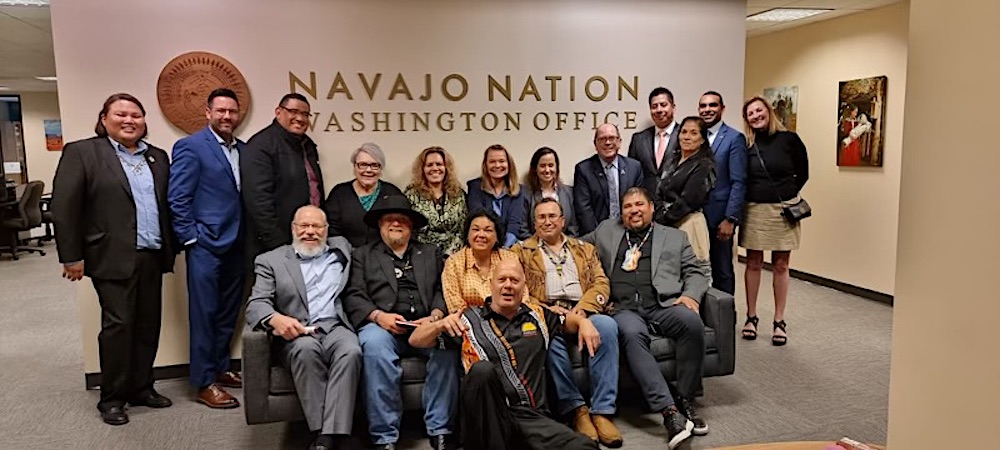
- Details
- By Chez Oxendine
- Economic Development
The First Nations Trade Mission concluded its second portion in recent weeks as Indigenous delegates from Australia toured sites in Alaska, Washington, D.C. and New Orleans, La. in a whirlwind of conferences, business deals and trade discussions.
Now that the conferences are over, the hard work begins, said Chad Johnson, founder of construction supplier Akana Group who helped launch the First Nations Trade Mission.
“As Native businesses, with these new opportunities in front of us, we have to really consider: What are we looking to do? How are we looking to grow?” Johnson said. “Now that the initial back and forth is over, we have to have the more complicated conversations of how we can really work together.”
Those conversations are worth having, according to Native American Business Association leader Amanda Smith, whose organization helped organize the First Nations Trade Mission’s first and second legs.
During the first visit, Native delegates visited Australia to meet with Aboriginal businesses and to open up conversations with Supply Nation, an organization established by the Australian government. Supply Nation catalogs the 4,000-plus Aboriginal enterprises across Australia for ease of discovery and contracting.
“We really focused on developing these new relationships in a way that would benefit everyone,” Smith said. “In less than a year, we’ve gone over there and brought them here. To have that support and that relationship has been amazing. We were able to host those businesses and show them our balance of culture and business. It was really great to have their support and for them to see some of the business barriers we’re up against.”
In the second leg of the trade mission, Australian delegates returned the favor, including Supply Nation representatives keen on relationship building, Smith told Tribal Business News. The idea is to build off of advice and experience from Supply Nation to better develop “a voice” for Native businesses, both among American corporate partners and through broader organizations like the National Minority Supplier Development Council.
“As Native businesses, we’re often told we don’t have a voice. We sometimes struggle to get responses from organizations like the NMSDC, so it was really great to have this global connection and really start building this unified voice together,” Smith said. “We visited the NMSDC conference in early November together and we were surrounded by so much love and support from global First Nations.”
The group also spoke with the Department of the Interior to support the Native American Business Association’s push for a centralized, supportive Native business catalog similar to Supply Nation’s operation in Australia.
“With all due respect, I appreciate the Buy Indian Act, and increasing percentages and goals, but if contracting officers don’t have a place to find these businesses, they’re going to have a reason not to utilize that,” Smith said. “Supply Nation was able to come in and say, ‘Hey, this is what we have in Australia. We have this foundation, we know what works.’
“With that foundation, organizations like NABA can go out and get that corporate support. What we need is government support to ensure this process isn’t costly or predatory for Native organizations.”
NABA and Supply Nation subsequently signed a memorandum of understanding to continue First Nations Trade Mission visits “probably annually,” Smith said.
“It’s just really about building a unified global voice and working with these people who have succeeded in this area to speak to these corporations that support them there, but not us here,” Smith said. “Through that MOU, we have that understanding that we are going to continue the visits with purpose, not just to go over there and say, ‘Hey, we attended this.’”
While in America, Supply Nation also established an MOU with the American Indian Chamber of Commerce of Oklahoma to open conversations between Australian and Oklahoman Indigenous businesses.
American Indian Chamber of Oklahoma president Bailey Walker called the MOU a “fantastic opportunity” for both parties.
“We really started that talk when we first visited Australia, and now we’ve kind of hashed out the particulars,” Walker said. “I’m excited to see where this next step takes us.”
Johnson also established partnerships for Akana Group in his first visit to Australia and further developed those relationships in October. He said working with Aboriginal businesses and Supply Nation proved to be a smoother experience than working with non-Native businesses.
The organizations found common ground in their experiences with colonialism and struggles to emerge in competitive markets where Indigenous peoples often found themselves overwhelmed by barriers to entry and larger corporations, Johnson said.
“We’re very high context culture people. It’s very relationship driven, and when you’re speaking with Indigenous peoples globally, it’s just a breath of fresh air,” Johnson said. “You don’t have to go through explanations, a lot of them already get it.”
The trade mission work also builds on long-standing traditions of trade and intertribal relationships, he added.
“I liken it to standing on the shoulders of giants. These trade routes were already in existence long before contact ever happened. Indigenous people have been traders since the beginning — we’re not really starting anything new,” Johnson said. “I feel like we’re just picking up where our ancestors left off.”
